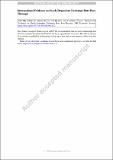| dc.contributor.author | Forbes, Kristin | |
| dc.contributor.author | Hjortsoe, Ida | |
| dc.contributor.author | Nenova, Tsvetelina | |
| dc.date.accessioned | 2021-09-20T17:31:00Z | |
| dc.date.available | 2021-09-20T17:31:00Z | |
| dc.date.issued | 2020-11-06 | |
| dc.identifier.uri | https://hdl.handle.net/1721.1/131934 | |
| dc.description.abstract | Abstract
We analyse the economic conditions (the “shocks”) behind currency movements and show how that analysis can help address a range of questions, focussing on exchange rate pass-through to prices. We build on a methodology previously developed for the UK and adapt this framework so that it can be applied to a diverse sample of countries using widely available data. The paper provides three examples of how this enriched methodology can be used to provide insights into pass-through and other questions. First, it shows that exchange rate movements caused by monetary policy shocks consistently correspond to significantly higher pass-through than those caused by demand shocks in a cross-section of countries, confirming earlier results for the UK. Second, it shows that the underlying shocks (especially monetary policy shocks) are particularly important for understanding the time-series dimension of pass-through, while the standard structural variables highlighted in the previous literature are most important for the cross-section dimension. Finally, the paper explores how the methodology can be used to shed light on the effects of monetary policy and the debate on “currency wars”: it shows that the role of monetary policy shocks in driving the exchange rate has increased moderately since the global financial crisis in advanced economies. | en_US |
| dc.publisher | Palgrave Macmillan UK | en_US |
| dc.relation.isversionof | https://doi.org/10.1057/s41308-020-00124-2 | en_US |
| dc.rights | Creative Commons Attribution-Noncommercial-Share Alike | en_US |
| dc.rights.uri | http://creativecommons.org/licenses/by-nc-sa/4.0/ | en_US |
| dc.source | Springer | en_US |
| dc.title | International Evidence on Shock-Dependent Exchange Rate Pass-Through | en_US |
| dc.type | Article | en_US |
| dc.contributor.department | Sloan School of Management | |
| dc.eprint.version | Author's final manuscript | en_US |
| dc.type.uri | http://purl.org/eprint/type/JournalArticle | en_US |
| eprint.status | http://purl.org/eprint/status/PeerReviewed | en_US |
| dc.date.updated | 2020-11-18T04:25:06Z | |
| dc.language.rfc3066 | en | |
| dc.rights.holder | Bank of England, under exclusive licence to International Monetary Fund 2020 | |
| dspace.date.submission | 2020-11-18T04:25:05Z | |
| mit.license | OPEN_ACCESS_POLICY | |
| mit.metadata.status | Authority Work and Publication Information Needed | |
